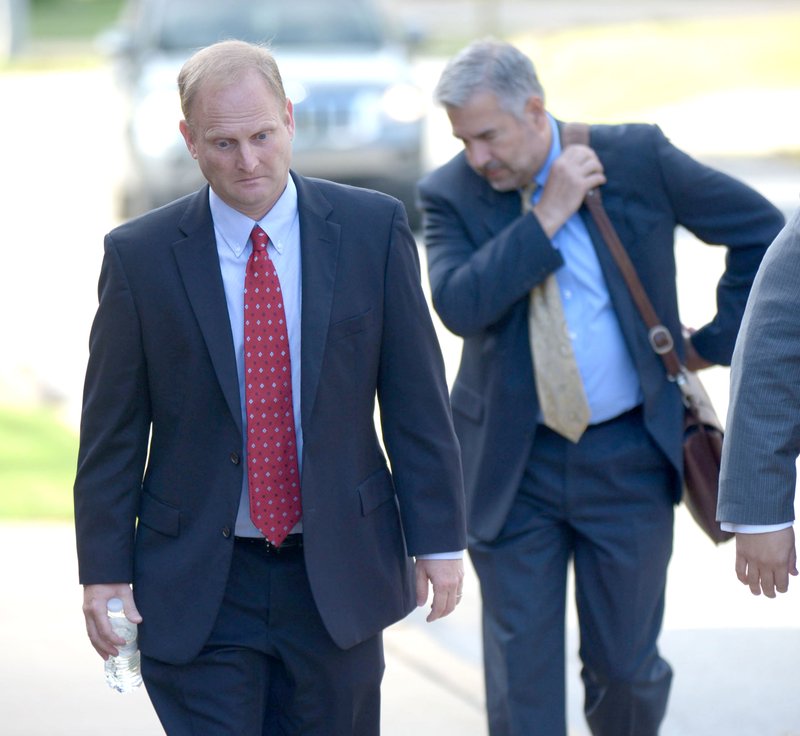FAYETTEVILLE -- A federal appeals court Tuesday upheld the conviction of Oren Paris III, the former Ecclesia College president who pleaded guilty in a kickback scheme involving former state Sen. Jon Woods.
Woods and co-conspirator Randell Shelton Jr. were appealing their convictions to the same court, the U.S. Court of Appeals for the 8th Circuit, on largely the same grounds. Fellow conspirator Micah Neal, a former state representative, has already served a one-year sentence of home detention for his role.
Paris, of Springdale, paid kickbacks to Woods and Neal, both of Springdale, in return for $550,000 in state grants to Ecclesia from 2013 to 2015. The kickbacks were routed through Shelton's consulting business, formerly based in Springdale. Paris is serving a three-year federal prison sentence on one charge of conspiracy.
Neal pleaded guilty to one count of conspiracy, cooperated with investigators and testified at Woods' and Shelton's trial. Woods and Shelton were convicted of multiple corruption charges May 3, 2018. Woods is serving an 18-year sentence. Shelton is serving six years.
Paris resigned as president of Ecclesia and pleaded guilty to one count of conspiracy April 4, 2018, just before his trial with Shelton and Woods was to begin. He agreed to plead guilty on the condition he be allowed to appeal on the basis of an FBI investigator's actions.
Agent Robert Cessario of the FBI wiped the hard drive of a laptop used to gather and send electronic files to defense attorneys in the case. He had the hard drive wiped professionally and then wiped it himself before turning it over to investigators after defense attorneys discovered he had not transferred all the files.
Cessario's actions came out in pre-trial hearings in the case. Paris decided to plead guilty after the trial judge ruled against the defendants' motions to dismiss the charges over Cessario's acts.
"After falsely telling prosecutors that the laptop's hard drive had been erased earlier, he paid a local computer shop to actually do it," as Tuesday's ruling says of Cessario's conduct. "Apparently unsure about whether a forensic examiner could still recover the data, he scrubbed the hard drive again -- this time on his own -- before finally delivering the laptop as requested."
The hard drive's wiping was the basis of Paris' appeal and is a large part of Woods' and Shelton's appeals. Some of the evidence destroyed could have helped the defense, the appeals argue. That doesn't appear likely, the appeals court ruled in Paris' case. The other appeals are still pending.
The presiding judge in Woods' and Shelton's trial in U.S. District Court in Fayetteville, Timothy Brooks, did bar Cessario from presenting evidence for the prosecution in the case. The agent was called as a defense witness at trial, but was barred from discussing his actions in regards to the laptop.
Paris' belief the laptop contained evidence that would help his case is "speculation built upon speculation," the appeals court ruled Tuesday. Paris' argument assumes Cessario risked his career to hide Paris' innocence when his motive could have been to hide the fact he possessed something he shouldn't have, the justices wrote.
"Paris is right that it is difficult for him to show what he cannot know," Tuesday's ruling says. "After all, only Agent Cessario knows for sure what he destroyed and whether it had any connection to this case. But without even a viable theory about what is missing, much less how it might differ from what he already had in his possession, Paris has not established a violation of his due process rights."
The remedy of allowing a trial while barring Cessario testimony for the prosecution is unjust, Paris' defense attorney, Travis Story of Fayetteville, had argued to the appeal court.
NW News on 04/01/2020

